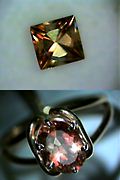![]()
Name:
Andalusite

Chem:
Al2SiO5
Aluminum Silicate
Crystal:
Orthorhombic (Large size gem quality crystals are rare.)
Color:
Strong pleochroism one axis/yellow-olive other axis/brown-red
Refrac. Index:
1.63 - 1.648![]()
Birefraction:
0.006
Hardness:
7.5 (gem quality)
Spec. Grav.:
3.12 - 3.18
Fracture:
conchoidal
Cleavage:
imperfect
Environment:
Found in pegmatites, gneiss, hydrothermal deposits, and gem gravel
Association:
quartz, muscovite, microcline, cordierite, topaz
Locals:
| Brazil | Sri Lanka | Canada | Spain |
Misc:
the name is from a region in Spain (Andalucia), it is one member of three minerals with the same composition, andalusite, sillmanite, and kyanite.
Gem info:
It is mainly a collectors item, and has not seen wide use in the jewelry trade, there is another variety called chiastolite that forms long prismatic crystals with a black cross in its cross section. The name comes from the Greek "chiastos" meaning "X-marked". It was used as an amulet by early Christens.